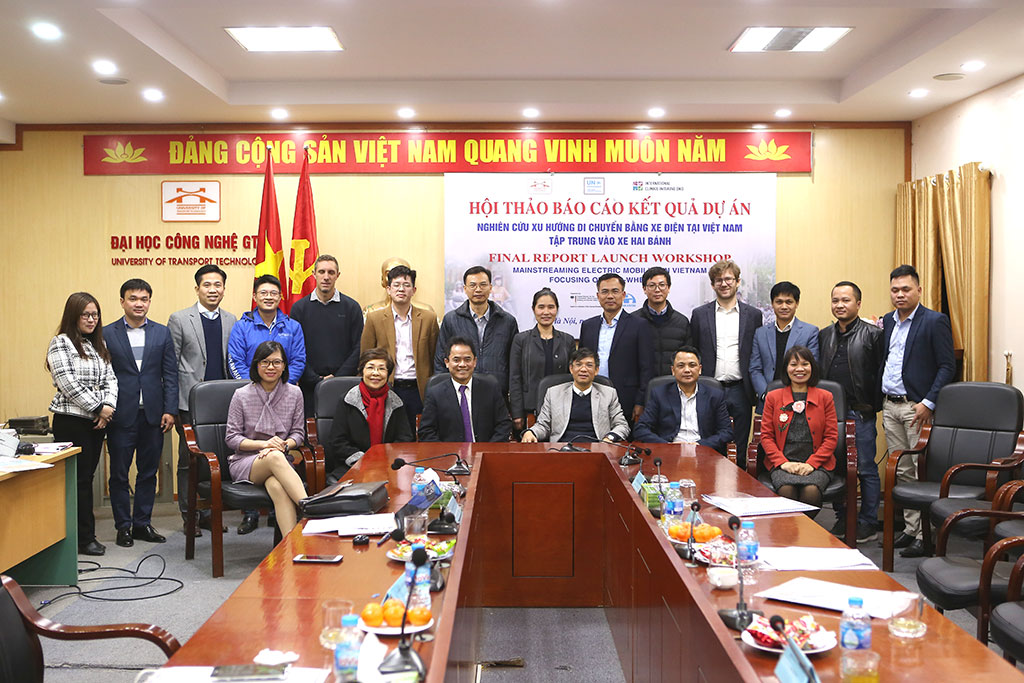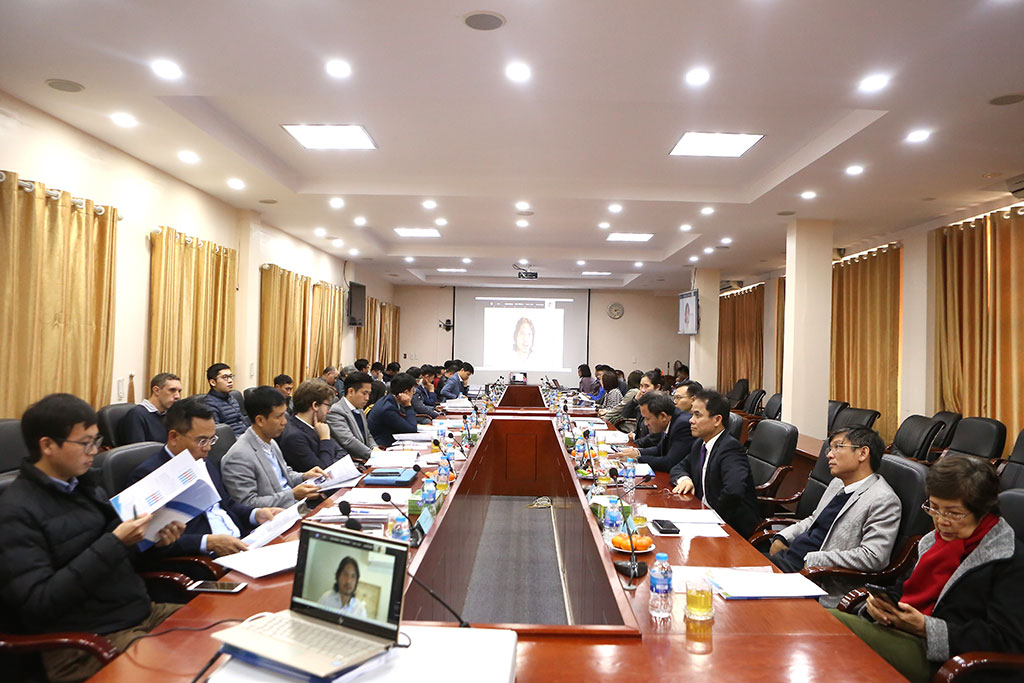Final Report Launch Workshop for “Mainstreaming electric mobility in Vietnam, focusing on two-wheelers”
Final Report Launch Workshop for “Mainstreaming electric mobility in Vietnam, focusing on two-wheelers” was held at the University of Transport Technology on December 16th 2020, Hanoi, Vietnam as a blended on-site/virtual event.
The project: "Mainstreaming electric mobility in Vietnam, focusing on two-wheelers" is supported by the United Nation Environment Programme (UNEP) and the BMU-IKI to integrate electric 2-3 wheelers in urban transport for East Africa and Southeast Asia covering countries including, Ethiopia, Kenya, and Uganda for East Africa and the Philippines, Thailand, and Vietnam for Southeast Asia.
In Vietnam, the project has been successfully conducted by a Research Group on Climate Change Responding at the University of Transport Technology with the advisory of leading experts in policy and standards development from the Ministry of Transport, National Traffic Safety Committee, Vietnam Register and Vietnam Association of Motorcycle Manufacturers.

This project on "Mainstreaming electric mobility in Vietnam" can be considered as one of the first comprehensive research projects on electric two-wheelers in Vietnam. The research findings are a significant contribution for strengthening and making additional policies to promote electric vehicle use, especially in developing a system of standards for electric vehicles, scenarios of CO2 emissions of two-wheelers, scenarios of electric energy consumption when transition to electric vehicles from ICE vehicles in Vietnam.
The launch was attended by Mr. Bert Fabian, Programme Officer, Sustainable Mobility Unit, UNEP; Dr. Khuat Viet Hung - Executive Vice Chairman of Vietnam National Traffic Safety Comittee; Mr. Nguyen Huu Tien - Deputy Director General, Department of Environment, Ministry of Transport; Mr. Tran Quang Ha - Deputy Director General, Department of Science and Technology, Ministry of Transport; representatives from the GIZ Vietnam, Ministry of Science and Technology, Vietnam Register, Vietnam Association of Motorcycles Manufactures, Hanoi Department of Transport, e-motorcyle companies, research institutes and universities; and more than 40 experts and scientists from countries in the world.

The project report has been published as a book by Publishing House of Transport with ISBN number 978-604-76-2323-5.
The main research findings are:
1. The average 2&3 wheeler fleet baseline and business-as-usual trends with CO2 and pollutant emissions projections. The report has analyzed and assessed the current market share of light passenger vehicles and motorbikes in Vietnam. The analysis results serve as a scientific basis for the selection of vehicle models to calculate the fuel baseline in Viet Nam. The fuel economy baseline and the CO2 emissions for light passenger vehicles and newly registered motorcycles was calculated from 2010 to 2017. The fuel economy baseline and CO2 emissions can be used as reference for the process of building emissions factors for vehicles, as the scientific basis for manufacturers, automobile assemblers and managers to reduce fuel consumption and CO2 emissions from vehicles.
2. The electricity demand baseline and trends given various electric mobility uptake scenarios. The report has surveyed and determined the average travel distance of motorcycles and calculated the required amount of electricity for the transition from ICE two-wheelers to electric two-wheelers under different conversion scenarios. The amount of electrical energy serving for transition of all ICE two-wheelers to electric two-wheelers only accounts for 0.22-5.58% of the total national electricity output. The economic and environmental efficiency was also analyzed and compared between using ICE two-wheelers to electric two-wheelers. The operation and maintenance cost of electric two-wheelers is only 1/10 and emits 1/3 of CO2 amount compared to ICE two-wheelers. A roadmap was proposed to convert ICE two-wheelers to electric two-wheelers. The roadmap is built on the electric two-wheeler production capacity of domestic and foreign enterprises, the trend of developing electric vehicles in the world, the current state of Vietnam's vehicle lineup, etc.
3. The local manufacturing potential for electric vehicles and their components as well as industry financing requirements. The report shows that the imported CBU model is gradually disappearing and replaced by domestically produced and assembled models. Electric vehicle manufacturers and assemblers expect the Government to build a credit support mechanism, creating opportunities for businesses to access preferential loans, tax exemptions, land use incentives, technology incentives, and product distribution support to reduce production costs.
4. The barriers for uptake of electric mobility in Vietnam and recommendations for mitigation. The report has investigated that in order to mitigate those barriers, the role of the Government is of utmost importance in shaping society and issuing policies to promote electric vehicles in Vietnam. The report has made a number of suggestions to overcome barriers such as: developing preferential policies, supporting investment to attract domestic and foreign investment projects in the field of vehicle manufacturing and assembly; having policies to support banks to reduce investment costs, especially research and development costs; having a reasonable special consumption tax policy to promote the development of electric vehicle production and consumption in Vietnam; develop infrastructure for electric vehicles, develop policies for batteries swapping, etc.
5. Design and Launch of Electric Mobility Pilot Study and Awareness-Raising Strategy. The report has designed and tested to control and compare the use of ICE two-wheelers to electric two-wheelers. The control test using gasoline scooters and electric scooters was conducted on the basis of surveying 90 gasoline scooters and 90 electric scooters (including 50 Honda PCX electric scooters sponsored by Honda). To evaluate the level of meeting the needs of electric vehicle users, the research team uses multivariate linear regression analysis to determine the impact level of factors (safety, economy, utility, convenience, environmental protection). The research results also serve as the basis for the formulation of awareness-raising strategies for using electric two-wheelers in Vietnam. The strategy to propagate and promote the benefits of electric vehicles in responding to climate change, protecting the environment and using alternative fuel sources to fossil fuels.
6. Technical studies to support the development of Policies and Standards for electric 2-wheelers. The report pointed out that the government should step up the development of policies to promote electric vehicle development in Vietnam. Adequate policies and management system needs to be developed to cover all stages of electric vehicle life cycle: from designing, manufacturing, trading and distributing, recovery and treatment of end-of-life electric vehicles and electric vehicle components. In the roadmap for electric vehicles, the policy system on technical standards and technical regulations for electric vehicles need to be built in advance in order to facilitate the safe integration of electric vehicles and meet the travel needs of people. It is necessary to establish specialized committees/sub-committees to develop technical standards and technical regulations with a roadmap scientifically and consistently among stakeholders. At the same time, when developing technical standards and technical regulations for electric vehicles, it is necessary to focus on harmonization with international standards.
Watch Report Video
View on Youtube: https://www.youtube.com/watch?v=J0waee2ymJY
Link download Report (pdf version): Download now





